|
|
|
Sort Order |
|
|
|
Items / Page
|
|
|
|
|
|
|
| Srl | Item |
| 1 |
ID:
132326
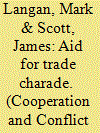

|
|
|
|
|
| Publication |
2014.
|
| Summary/Abstract |
Aid for Trade (AfT) has gained prominence as an innovative form of donor support in the 'post'-Washington Consensus. AfT mechanisms have been praised as a means of aligning trade liberalisation deals (whether in the Doha Round or within bilaterals) to poverty reduction objectives. This article, through critical analysis of AfT discourse within the 'moral economies' of multilateral World Trade Organization and bilateral European Union-African, Caribbean and Pacific negotiations, points to the strategic purposes of donor language in rationalising asymmetric North-South trade systems. Moreover, it questions the 'development' credentials of AfT assistance by examining some of the ensuing private sector activities and the impact on the supposed beneficiaries, and the tying of AfT disbursements to the implementation of inappropriate policies.
|
|
|
|
|
|
|
|
|
|
|
|
|
|
|
|
| 2 |
ID:
125310
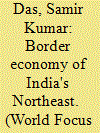

|
|
|
|
|
| Publication |
2013.
|
| Summary/Abstract |
Border trade perhaps is the answer - only if we realize that there is a larger moral economy of border trade the gains of which far outweigh its meagre economic returns. Doesn't the moral economy of border trade force us to revisit both the dominant discourses of national security and functional integration and see how they mutate and transform under present conditions?
|
|
|
|
|
|
|
|
|
|
|
|
|
|
|
|
| 3 |
ID:
162520
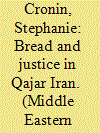

|
|
|
|
|
| Summary/Abstract |
In 1971, E. P. Thompson published a seminal article on eighteenth century English bread riots which was to become a foundational text for the study of such protests. Challenging older elite notions of the irrationality, illegitimacy and even criminality of the ‘mob’, Thompson situated popular direct action in times of food crises within a very specific historical, economic and, most importantly, cultural context. This context produced a deeply held adhesion among the poor to the concept of a ‘moral economy’ and an equally profound rejection of the free market as enshrined in the new political economy of the eighteenth century. This article returns to Thompson's original text in order to assess to what extent his paradigm may be useful in understanding bread riots in Iran. In particular, it examines the evidence which supports the notion that Iran experienced a ‘golden age’ of bread riots in the 1890s and early 1900s, just before and indeed contributing to the outbreak of the constitutional revolution.
|
|
|
|
|
|
|
|
|
|
|
|
|
|
|
|
| 4 |
ID:
183686
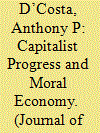

|
|
|
|
|
| Summary/Abstract |
Capitalist progress implies the destruction of the old and uncompetitive sectors and the creation of new ones in their wake. However, in the Global South the loss of jobs in the older sectors is not necessarily offset by the new forms of employment. The objective of this paper is to critically examine how the vast employment in the Indian handloom sector could be sustained, given the competitive pressures from alternative technologies and products. Rather than allow the sector to be a victim of capitalist progress, this paper on moral economy grounds offers an alternative approach, which is to boost the demand for handloom products through commercial branding but one that is rooted in cultural valorization of artisanal craft. This strategy, complementary to state provisioning of subsidized inputs, comes at the expense of authenticity but is expected to enhance consumption and sustain livelihoods in the handloom sector.
|
|
|
|
|
|
|
|
|
|
|
|
|
|
|
|
| 5 |
ID:
179989
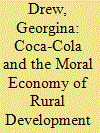

|
|
|
|
|
| Summary/Abstract |
This paper examines the knowledge-practices used by rural activists to raise public concerns about the use of water and land resources by a Coca-Cola bottling plant in Uttar Pradesh, India, between 2004 and 2014. These knowledge-practices included the use of semiotics and carefully crafted discourses—such as slogans and protest songs—to produce knowledge about villagers’ rights to rural subsistence and survival. An aim of this paper is to show the impressive ways in which the social movement persevered by building both public claims to a moral economy as well as village-level practices and institutions that helped to enact visions of what a moral economy could or should be. Of particular significance were activists’ efforts to frame rural water extraction and water rights through a subsistence-focused morality of rural development. This moral economy underscores villager-articulated desires for beneficial forms of economic activity that support rural livelihoods rather than prioritising environmentally destructive corporate activities.
|
|
|
|
|
|
|
|
|
|
|
|
|
|
|
|
| 6 |
ID:
152125


|
|
|
|
|
| Summary/Abstract |
The argument of the moral economy of mines claims to illuminate the consent and associational power of mineworkers, and thereby the real foundation of social exchanges between management and black mineworkers. Our collection of life histories shows how the moral economy was fragile and its codes not widely accepted. As a tool of analysis it does not include certain facets of the workers’ experience, feeling and human essence. The moral–economic relationship was conducive to surplus extraction by eliminating the non-conformist but industrious or sick workers in the labour system. It contributed to morbid sexual and emotional ways of life. The life histories further reveal how the rank-and-file generally endorsed and participated in what Moodie depicts as a positive class compromise struck between management and the workers’ union from the 1980s to the 1990s. It brought to them conditions for a regular family life and ‘advancing humanity’. This notwithstanding, our narrators found that the norm of apartheid gave way to that of discrimination and differentiation between black workers. Management replaced white ‘boss-ism’ by economism and a corporatist model of labour–management relationship. It engendered the spirit of new ways to secure opportunity.
|
|
|
|
|
|
|
|
|
|
|
|
|
|
|
|
| 7 |
ID:
158206
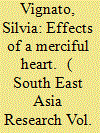

|
|
|
|
|
| Summary/Abstract |
In this article, I examine the relationship of charitable help that, through the persons and the work of caregivers, connects some donors to the young persons who grow up in home-based childcare institutions in contemporary Malaysia. The prism of my analysis is the small charity functions that take place within the homes that I have studied, which allow donors and receivers to elaborate, perfect and enact moral ideas of themselves and of their place in society. Because they stage the main characters of charity, the functions also give an insight into how, since an early age, children actively explore the dominant and largely ethnicized model of virtue and merit they are summoned to embody, thus making sense of their shared condition of “charity children”. This self-care work, I argue, inspired by Erica Bornstein’s study on Indian charity, is made possible by the “pure gift” core that characterizes donors and caretakers, as it frees the aided children from the necessity to “buy” their care back, which is otherwise requested in traditional child fostering.
|
|
|
|
|
|
|
|
|
|
|
|
|
|
|
|
| 8 |
ID:
006385
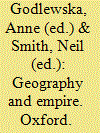

|
|
|
|
|
| Publication |
Oxford, Blackwell, 1994.
|
| Description |
xi, 404p.Pbk
|
| Series |
Special Publications Series
|
| Standard Number |
0631193855
|
|
|
|
|
|
|
|
|
|
|
|
Copies: C:1/I:0,R:0,Q:0
Circulation
| Accession# | Call# | Current Location | Status | Policy | Location |
| 038044 | 910.01/GOD 038044 | Main | On Shelf | General | |
|
|
|
|
| 9 |
ID:
152482
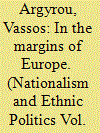

|
|
|
|
|
| Summary/Abstract |
This article argues that Greek Cypriot nationalism has been in large part motivated by the misconceived idea of Cyprus becoming a modern, European society. Although Cyprus joined the European Union in 2004, the perception of it by the European north as a culturally marginal Mediterranean society had not changed. This was amply demonstrated in 2013 when Cyprus applied to the EU for urgent financial assistance. It was forced to capitalize its banks through their customers' savings and, although this and other “corrective” measures were couched in seemingly rational economic terms, they were unmistakably a punishment and a civilizational lesson.
|
|
|
|
|
|
|
|
|
|
|
|
|
|
|
|
| 10 |
ID:
142661
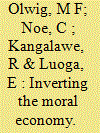

|
|
|
|
|
| Summary/Abstract |
Governments, donors and investors often promote land acquisitions for forest plantations as global climate change mitigation via carbon sequestration. Investors’ forestry thereby becomes part of a global moral economy imaginary. Using examples from Tanzania we critically examine the global moral economy’s narrative foundation, which presents trees as axiomatically ‘green’, ‘idle’ land as waste and economic investments as benefiting the relevant communities. In this way the traditional supposition of the moral economy as invoked by the economic underclass to maintain the basis of their subsistence is inverted and subverted, at a potentially serious cost to the subjects of such land acquisition.
|
|
|
|
|
|
|
|
|
|
|
|
|
|
|
|
| 11 |
ID:
142618
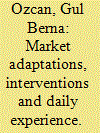

|
|
|
|
|
| Summary/Abstract |
This special issue illuminates diverse realities of post-Soviet development in Central Asia through a multidisciplinary prism. The contributing articles are grounded in a range of social science disciplines including architecture, anthropology and geography, as well as drawing from mainstream social sciences. The analyses demonstrate how a synthesis of specialist knowledge from area studies and individual disciplinary methodologies can provide well-grounded critical positions on development.
|
|
|
|
|
|
|
|
|
|
|
|
|
|
|
|
| 12 |
ID:
106503
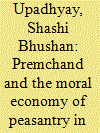

|
|
|
| 13 |
ID:
192192
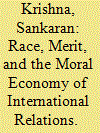

|
|
|
|
|
| Summary/Abstract |
International Relations (IR) as a discipline explains the fact of global inequality through a discourse of meritocracy. In the early decades of the discipline, such explanations were explicitly racial, and justified empire and Western dominance on the basis of their innate superiority over the rest of the world. In later and in contemporary times, such racialized explanations for inequality have been replaced by ostensibly merit-based explanations that turn out, on closer examination, to replicate the inner logic and exclusionary claims of earlier ones. The notion of meritocracy has been a key element in the ideological appeal of IR as a discourse to elites and aspiring middle classes central to nation-building efforts in the global South. This latter fact complicates efforts that equate decolonizing the discipline with the promotion of diversity in its membership and the widening of its empirical and theoretical concerns. Central to any notion of a genuinely decolonial IR must be an attack on the very idea of merit as explaining and justifying international and domestic inequality.
|
|
|
|
|
|
|
|
|
|
|
|
|
|
|
|
| 14 |
ID:
157090
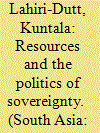

|
|
|
|
|
| Summary/Abstract |
This paper analyses the socio-legal and political spaces within which coal is mined in India and asks if it is possible to raise the ‘moral question’ when the state attributes an iconic status to coal. The empirical evidence comes from two indigenous-dominated states that practise community coal mining. If the coal mining communities in Jharkhand exert a moral claim by mining illegally, those in Meghalaya exert a political claim by invoking the special status the state enjoys under the Indian Constitution. This paper examines this grey zone of non-legality in order to understand resource conflicts and dispossession beyond the straightforward distinctions between legal and illegal.
|
|
|
|
|
|
|
|
|
|
|
|
|
|
|
|
| 15 |
ID:
133703
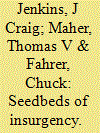

|
|
|
|
|
| Publication |
2014.
|
| Summary/Abstract |
Studies of insurgency and collective action are divided between structural and dynamic explanations. Structural theories address the presence of insurgency while dynamic theories focus on the frequency of insurgent actions. Yet prior studies often treat these arguments additively, leaving unclear how structural and dynamic processes affect these different aspects of insurgency. This study addresses this division by using zero-inflated negative binomial regression to examine in a single equation both the presence and the count of Islamist insurgency in Egyptian governorates between 1986 and 1999. We test political economy, moral economy, and cultural clash explanations of the presence of insurgency alongside political dynamics arguments about repression and exclusion to explain the count of attacks. Looking at the structural side of this equation, we find that communities with high rates of poverty, child mortality, cultural conservatism in terms of low contraceptive prevalence, and greater urban density are more likely to support insurgency. Looking at the dynamic side, parliamentary exclusion, security sweeps, and executions affect the count of attacks along with spatial diffusion from neighboring governorates. The culturally conservative region of Upper Egypt, which has a history of social and political marginality and opposition, provided a seedbed of insurgent support but this challenge broke down over time as repression intensified and exclusion was relaxed. These findings underscore the point that the presence of and the intensity of insurgency are distinct and driven by different factors. There are notable methodological and theoretical advantages to distinguishing between presence and count to better understand when and where insurgencies develop and their level of collective action.
|
|
|
|
|
|
|
|
|
|
|
|
|
|
|
|
| 16 |
ID:
175050
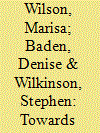

|
|
|
|
|
| Summary/Abstract |
The concept of moral economy can be applied to all types of economies as they all involve conceptions of the ‘common good’ that determine who gets what, why and how, and who is responsible for this distribution, eg state or private actors. In this paper, we use the concept of moral economy to demonstrate how particular morals and logics shape public health governance in Cuba, comparing these with market liberal contexts. The paper draws from ethnographic and interview data from Cuba to evaluate the benefits and drawbacks of Cuban agri-food governance, against the backdrop of market liberal approaches. While Cuban interviewees justified their activities in terms of Cuba’s moral economy of collective need, there were also instances when the socialist moral economy conflicted with individual needs and aspirations. We conclude that, despite its faults, Cuba’s holistic approach to food and agriculture illustrates how ecological approaches to public health might work in practice.
|
|
|
|
|
|
|
|
|
|
|
|
|
|
|
|
| 17 |
ID:
161128
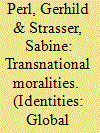

|
|
|
|
|
| Summary/Abstract |
The death of Alan Kurdi, the boy washed ashore in Turkey in September 2015, provoked a global moral outcry. The pictures of the toddler went viral across social networks and in the media. Following these images across borders, we analyse moral and political responses to the ‘EU refugee crisis’ by illuminating the circumstances under which people feel, take on, and demand responsibility. Considering EU policies and their lethal consequences as mechanisms of an organised irresponsibility, we show how the circulation and modification of the images played on moral sentiments and on political demands in Europe and across the Mediterranean. The anthropological engagement with transnational moralities contributes to the analysis of politics of ir/responsibility of and against the EU border regime.
|
|
|
|
|
|
|
|
|
|
|
|
|
|
|
|
| 18 |
ID:
187049
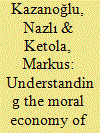

|
|
|
|
|
| Summary/Abstract |
The implementation of neoliberal welfare frameworks since the ascendancy of the Justice and Development Party in 2002 has led to a fundamental reorientation of the state-civil society relationship, where non-governmental organizations (NGOs) have been given wide-reaching roles in the delivery of welfare. In the field of family policy, the NGOs benefitting from such policies are largely faith-based organizations with close relationships with the AKP government. Based on interviews with Turkish women’s NGOs (WNGOs), this article studies the intersections of gender, family, civil society, and the state to shed light on the development of contemporary welfare policy in Turkey.
|
|
|
|
|
|
|
|
|
|
|
|
|
|
|
|
| 19 |
ID:
185616
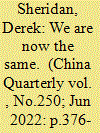

|
|
|
|
|
| Summary/Abstract |
Many accounts of Chinese migration in Africa compare China to “the West.” However, lived historical experiences, social hierarchies and moral mappings of the division of labour have mediated how different peoples in different contexts have received, interacted with and given meaning to Chinese migrants. In Dar es Salaam, Tanzania, Tanzanians talk about so-called Chinese “wamachinga” (petty traders) who have complicated long-standing ideas about “African” and “non-African” roles in the economy, and who have both opened and closed opportunities for different African traders. Based on ethnographic fieldwork in the key Tanzanian wholesale market of Kariakoo, I examine how the entry of Chinese goods and traders has been associated with shifting local economic hierarchies. I argue that debates over the presence of Chinese traders are less about “China” than about the politics of which roles belong to whom in a hierarchical division of labour.
|
|
|
|
|
|
|
|
|
|
|
|
|
|
|
|
| 20 |
ID:
177965
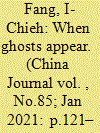

|
|
|
|
|
| Summary/Abstract |
This article discusses the haunting of a factory in Shenzhen, China. The haunting coincided with the 2008 global financial crisis that resulted in a decline in factory orders, leaving the workers, mostly migrants from the countryside, idle. With the appearance of ghosts, the workers found a cultural language that indirectly expressed their anxiety about future undisclosed measures to restructure the factory. In the end, the factory owner was forced to come forward to deal with the ghosts by performing a customary folk ritual. Starting from this scenario, it will be shown how claiming to see ghosts constitutes a political act and reveals practices within a modern factory that engage in a “moral economy” mutuality between management and workers. Through this, people in the factory gained bargaining power built upon reciprocity and social debts and were able to articulate their concerns using a supernatural system of meaning. By way of the ghost panic, they created room for corrective action even in a difficult situation.
|
|
|
|
|
|
|
|
|
|
|
|
|
|
|
|
|
|
|
|
|